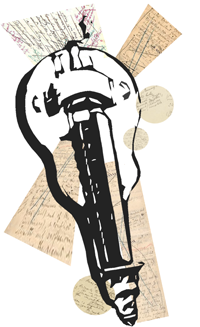Oklahoma City scored a print of Quentin Tarantino’s new movie The Hateful Eight, so we loaded up and headed out. That’s print, as in film, 70mm to be exact, shot on the same cameras used for Ben Hur. If you haven’t noticed, theaters have gone to all digital projection, so there is no more film. No more spools spliced together or projectionists that know how to coax the machines to life, no circles in the corner to signal a reel change is coming. If you’re under 30 or so that all seems as mysterious as Betamax.
The film had a souvenir program and an overture and even an intermission so the Quentin geeks could all joyfully discuss their theories of where the movie was headed and compare it to others. The marketing machine called the whole shebang the Roadshow.
I’m not one to get too worked up about the passing of film; having lived most of my life in small towns, I don’t miss the grimy prints, full of scratches, that arrived in the theater after getting worn out in larger markets. But seeing a pristine copy of a 70mm film does provide a different experience than digital. Call it warmth, call it tone–you just know you’re watching something with another layer of complexity.
The amount of energy spent defending or dismissing Tarantino only points to his importance within the culture. He makes you think about issues such as race and violence beyond the normal platitudes of our current conversations. The questions, “should I be enjoying this, and if not, why am I anyway?” requires a much greater skill than more timid critics and artists realize.
Dana Stevens, the perceptive film critic at Slate, expresses bafflement at Tarantino’s foray into historical revision/revenge beginning with Inglorious Basterds, continuing through Django Unchained to The Hateful Eight. But the move has a logic if you think of Tarantino’s films working through his own nostalgia and admiration. He payed homage to all the marginalized genres he loves like blaxploitation and martial arts and grindhouse and then turned his attention to his historical preoccupations. Taking whatever he wants from his favorite styles, directors, and historical moments, Tarantino creates the world he wants, which has always been the power of making movies for him.
Yet there is one mimetic strategy that Tarantino employs that keep his movies grounded in reality. People talk and talk and talk in a Tarantino movie, often driving some viewers to distraction. But what they talk about matters: characters build narratives about their lives and the lives of those around them and then have those narratives challenged and reconstructed by others. In Eight, the bounty hunter Major Marquis Warren, played by Samuel L. Jackson, certainly fought in the Civil War. But was he the confidante of Lincoln or a coward? Did he act honorably? Is any action he took against the Confederates justified? Warren certainly has decided what his life means, but he is constantly assailed by others to arrive at a different conclusion.
We spend much more time thinking about what we are going to do and have done than we ever do in actual action. Endless years can be consumed picking at the briefest of moments. A single event can paralyze us from moving forward as we dissect it from every angle, while even the most fleeting experience of glory can leave us mired in the past, trying to warm ourselves in its glow.
That’s what Tarantino gets right about life; the eruption of violence entertains and disrupts, but the storytelling that dominates long stretches of his work is the real achievement. Only Tarantino has the nerve to shoot in 70mm and then confine his characters to a single room for the majority of the film. We want our lives to be a Panavision spectacle, but we spend vast quantities of our existence in the cramped corners we fashion from our fears and hesitations and regrets in the stories we tell about ourselves and allow others to manipulate and control. Stories we keep repeating instead of writing new chapters. That’s the genius of Tarantino, capturing that compulsion for narrative that has become even more pervasive in a culture with unlimited means to post pictures and words about us doing the most trivial things, which others then argue over incessantly. Never has a society said so much about doing so little, and no one has captured that impulse like Tarantino.






